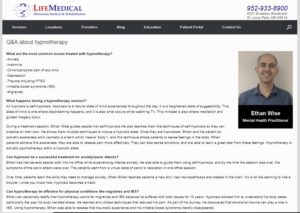 I was recently interviewed by the media person at Life Medical, she asked about hypnosis and hypnotherapy. Here’s some of that interview article.
I was recently interviewed by the media person at Life Medical, she asked about hypnosis and hypnotherapy. Here’s some of that interview article.
What are the most common issues treated with hypnotherapy?
-Anxiety
-Insomnia
-Chronicphysical pain of any kind
-Depression
-Trauma,including PTSD
-Irritable bowel syndrome (IBS)
-Migraines
What happens during a hypnotherapy session?
All hypnosis is self-hypnosis. Hypnosis is a natural state of mind experienced throughout the day. It is a heightened state of suggestibility. This state of mind is one where daydreaming happens, and it is also what occurs while watching TV. This mindset is also where meditation and guided imagery occur.
During a treatment session, Ethan Wise guides people into self-hypnosis.He also teaches them the techniques of self-hypnosis so they can practice on their own. He shows them multiple techniques to induce a hypnotic state. Once they are hypnotized, Ethan and the patient do somatic awareness work (somatic is a term which means “body”), and this technique allows patients to sense feelings in the body. When patients achieve this awareness, they are able to release pain more effectively. They can also sense emotions, and are able to learn a great deal from these feelings. Hypnotherapy is actually psychotherapy within a hypnotic state.
Can hypnosis be a successful treatment for anxiety/panic attacks?
Ethan has had several people walk into his office while experiencing intense anxiety. He was able to guide them using self-hypnosis; and by the time the session was over, the symptoms of the panic attack were over. The patients went from a virtual state of panic to relaxation in one office session.
Over time, patients learn the skills they need to manage anxiety. When Ethan teaches patients a new skill, new neuropathways are created in the brain. It’s a lot like learning to ride a bicycle – once you know how, hypnosis becomes a habit.
Can hypnotherapy be effective for physical conditions like migraines and IBS?
Ethan can personally testify that hypnotherapy works for migraines and IBS because he suffered with both issues for 10 years. Hypnosis allowed him to understand his body better, particularly the way his body handled stress. He learned and utilized techniques that reduced his pain. As part of his journey, he discovered that emotional trauma can play a role in IBS. Using hypnotherapy, Ethan was able to release that traumatic experience and his irritable bowel syndrome literally disappeared.
Does hypnotherapy also help to lower stress levels?
Stress is implicated in almost all disease and pain conditions. In today’s hectic world many of us are tense virtually all the time. This chronic tension can contribute to headaches, trigger IBS, and worsen pain. Ethan teaches patients to reduce stress, along with improving patients’ somatic awareness. This process is not only cognitive, it is experiential. During a session, patients experience this process directly, creating confidence in their ability to utilize somatic awareness on their own.
One patient told Ethan that he became so relaxed during hypnotherapy, he achieved a level of relaxation that he didn’t think he could ever achieve.
Can hypnotherapy help replace or reduce the need for pharmaceuticals?
Ethan has patients who have been able to taper off their medications using this drug-free alternative. They can either use hypnosis side-by-side with pharmaceuticals or while tapering off pharmaceuticals with their medical provider’s guidance.
On average, how many sessions does it take to see successful results?
The number of sessions necessary depends on the person, their condition, how long they’ve had the condition, and its severity. However, Ethan believes that hypnotherapy is much more effective in achieving results than traditional “talk therapy”.
Find the full interview here: https://www.lifemedical.us/qa-about-hypnotherapy/







